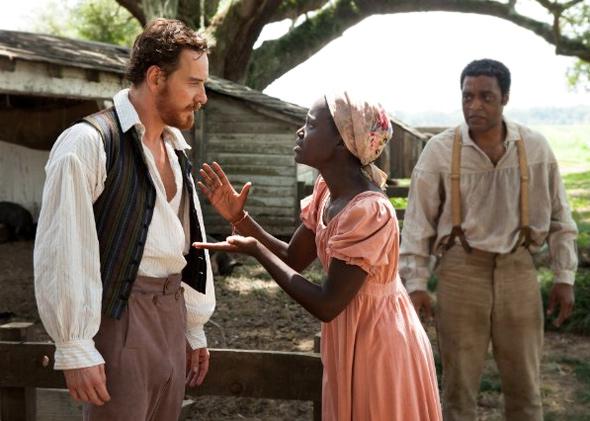Dear Dana, Andrew, and Mark,
I, too, spent the last evening rewatching parts of 12 Years a Slave, partly, as Dana did, to gain a better understanding of my initial reaction to it. But as I was watching—and my feelings about the movie haven’t changed since I wrote my initial, mostly negative review—what really struck me is that even though many people feel passionate about this movie, it’s still not the kind of work people are eager to fight about, or even talk about. I don’t necessarily mean that people are afraid to talk about it (though that would be understandable, because the subject matter is so loaded). But look at us here in Movie Club: Some of us love, or at least deeply admire, 12 Years a Slave; others have problems with it. Even we, people who generally like to argue about things we care about (pro or con), felt a more immediate need to wrestle with Her, The Wolf of Wall Street, and even Captain Phillips.
I’m not trying to draw any conclusions, really just floating an observation. Since we began yakking on Monday, 12 Years a Slave is the shadow in the room that kept drawing our apprehensive gaze: “At some point, we’ll have to talk about it.” Truthfully, I still don’t want to talk about it. The movie tells such a harrowing story—and yet, for all its depicted horror, left me feeling so little. Even so, I know that movies are not all about “feelings,” especially “my feelings,” and Andrew, you’ve made an eloquent case for the intellectual and moral challenges the movie presents. And I should say that I do like the way John Ridley’s screenplay mirrors the courtly language of Solomon Northup’s book: You read it and believe the elegance and orderliness of words can actually mean something, that grammar can defy horror.
McQueen is an inherently elegant, orderly filmmaker, too—as you pointed out, Andrew, a formalist—but I think his precision fails him here. On both the first and the second viewing, I was keenly aware of the careful, deliberate camera work during the pivotal scene in which Solomon is forced to whip Patsey. It’s a graceful, comma-shaped arc that sweeps gently to capture the monstrosity of the moment—Solomon’s horror and despair, Fassbender’s figurative mustache-twirling blankness. And ultimately, it rests on Patsey’s face, so beautiful and serene when it’s at peace but now grimacing in pain. This is camera work that says, “Behold!” instead of just “Look.” As if merely seeing wouldn’t be enough.
Some have made the case that Django Unchained and Mandingo—let’s call them both exploitation movies, for lack of a better term—say more about the horrors of slavery than 12 Years a Slave does. I hate to introduce that pretty wham-o idea without having the time or the space to explore it. And I’ve never seen Mandingo, something I have to remedy. But there is something about the bluntness of exploitation that makes it better suited than “arthouse films”—hate to use that phrase, but Andrew has already introduced the idea that 12 Years a Slave was never intended to be a multiplex blockbuster—to deal with certain real-life horrors. Maybe because with exploitation, we see first and think later. Or maybe we don’t think, but often the bruise from the blow remains. 12 Years a Slave left me with no bruises. That’s not to say some images won’t stick with me: That vision of Patsey sitting in the field, making dolls out of cornhusks. Others are hard at work, but she’s been allowed this special privilege because of her cruel master’s favoritism (for lack of a better word). That image tells us so much about Patsey’s innocence, but also about her need to shut out the horrors around her, if only for a few peaceful minutes. It’s a seemingly gentle moment with ferociousness packed inside. I wanted more of that from 12 Years a Slave. I wanted more bruises, instead of feeling, as I did, that I’d just watched a very thoughtful, considered, artistic film about the horror of slavery.
And now I’m thinking if I write another paragraph, about something, anything—how much I laughed at the virginal (and trying not to be) Aubrey Plaza in The To-Do List, or how much fun I had at Best Man Holiday, a sequel to a hit movie that we had to wait 14 years for—I’ll prolong the Movie Club experience just a little bit longer. But there’s no way to stave off the inevitable. It’s been a pleasure, Dana, Mark, Andrew, and Wesley, to be here with you this week. You’ve challenged me and energized me in ways you can’t imagine. I’m fortified for the year ahead. Mark, you’ve even got me looking forward to Oscar season, and that’s something! So now I hand the discussion over to you.
Lots of love,
Stephanie
